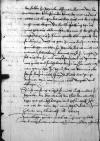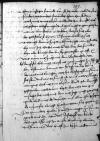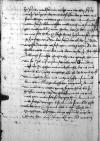Freuntlichen grues mit erbiettung was ich liebs und wolgefallens vermag zuvoran. / Edler, gestrenger herr, gunstiger freundt.
Ewr Herlichkeit ⌊⌋ neben unsers sundern, vertrautten freundes, hern ⌊Hanses von Werden⌋, auch eines ⌊ersamen radts von Danczke⌋, / hab ich gestern ⌊⌋, / und hab nicht ungern gelesen meiner lanndsleut widerkern. / Das sie sich aber der geltsteur, / so die von ⌊Thorn⌋ und ⌊Elbing⌋ sich villeicht daraus zugeen, / besuren, / het wenig stille bey mir. / Ich halts noch da vor, das / das hundts beyn oder ⌊knoche⌋ dar ein sey gewerffen gewest / etc. Was ewrn auszueg mit dem geschickhten von ⌊Dangzke⌋ belanngt, / waiss ich noch nichts zu schreyben, / biss mein dienner von ⌊koniglicher majestet⌋ wider kome. / Der wirt mit bringen, / was die botschafft auf curie sol sein, / und wie es sunst ist umb alles. / Nichts wenigers hab ich ein ⌊ersam radt gen Danczk⌋ ⌊⌋ noch ewrm beger, / das ichs vor gut an seche, das noch mit dem aus zoge nicht geeylleth werde, / und mich der ursachen auf Ewr Herlichkeit gezogen, die anzweifel / bericht hierinne von sich gegeben / etc. Des hanndels halben, so wir im wagen zu samen geredt, und den hern von ⌊bischoff von Kraka⌋ belanget, / losse ich in unser beredung berwen, / und so wir mit Gots hulf im korzen widerumb zu samen werden komen, muge wir weitter, / so sich was zu truge, / under uns entslissen. / Des guetten und freuntlichen willens gen mir thu ich mich mit allem fleiss bedannckhen. Will mich auch so widerum[b] geen euch und die ewrn halten, / das ir kein misfalle[n] an mir solt haben etc. Negst, do wir zusamen sein gewest, ist zwischen uns von der formm des eidts zu reden vergessen, / wolhe ich fast gern wolt sechen. / Bit der halben, welt mir die mit dem ersten zu schickhen. / ⌊Olbrecht Finckht⌋ ist hie bey mir gewest, / het mir von ⌊ferstlicher irlauchtt⌋ auf unsern schreiben von ⌊Graudens⌋, negst vor in gethon, ⌊⌋ bracht, / des ich euch hiemit ein copey eingelegt. / Er bit rodt und hulf. Vermueget ir im mit meym hohem freundt, dem hern ⌊margenborgschen weywoden⌋, / den ich von meinem wegen gantz freuntlich bit zu grussen, was guets verhelffen, / will ich auch noch gern mein fleiss darpey thun, / do mit nit mit solchen verjagen diss lanndt frembde geste uberkhuene etc. Hiemit lebe Ewer Herlichkeit, Gothe dem almechtigen befelhen, lange gesundt.


